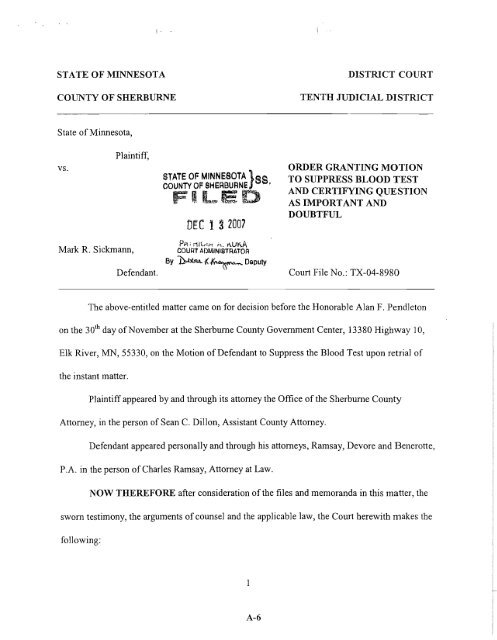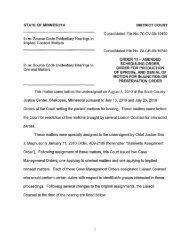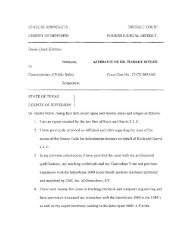ordered - Minnesota DWI Defense Blog
ordered - Minnesota DWI Defense Blog
ordered - Minnesota DWI Defense Blog
- No tags were found...
Create successful ePaper yourself
Turn your PDF publications into a flip-book with our unique Google optimized e-Paper software.
STATE OF MINNESOTA<br />
COUNTY OF SHERBURNE<br />
DISTRICT COURT<br />
TENTH JUDICIAL DISTRICT<br />
State of<strong>Minnesota</strong>,<br />
vs.<br />
Plaintiff,<br />
STATE OF MINNESOTA }as<br />
COUNTY OF SHERBURNE . •<br />
FI IE<br />
oEe 13 2007<br />
ORDER GRANTING MOTION<br />
TO SUPPRESS BLOOD TEST<br />
AND CERTIFYING QUESTION<br />
AS IMPORTANT AND<br />
DOUBTFUL<br />
Mark R. Sickmann,<br />
Defendant.<br />
Pi-\, riil,iri ;,. i\Ui'\A<br />
coum ADMiNISTRATOR<br />
By .~ t..~ Deputy<br />
Court File No.: TX-04-8980<br />
The above-entitled matter came on for decision before the Honorable Alan F. Pendleton<br />
on the 30 th day ofNovember at the Sherburne County Government Center, 13380 Highway 10,<br />
Elk River, MN, 55330, on the Motion ofDefendant to Suppress the Blood Test upon retrial of<br />
the instant matter.<br />
Plaintiff appeared by and through its attorney the Office ofthe Sherburne County<br />
Attorney, in the person of Sean C. Dillon, Assistant County Attorney.<br />
Defendant appeared personally and through his attorneys, Ramsay, Devore and Benerotte,<br />
P.A. in the person ofCharles Ramsay, Attorney at Law.<br />
NOW THEREFORE after consideration ofthe files and memoranda in this matter, the<br />
sworn testimony, the arguments ofcounsel and the applicable law, the Court herewith makes the<br />
following:<br />
A-6
ORDER GRANTING MOTION TO SUPPRESS BLOOD TEST AND CERTIFYING<br />
QUESTION AS IMPORTANT AND DOUBTFUL<br />
I.<br />
Defendant's Motion to Suppress the Blood Test upon retrial ofthe instant matter because<br />
the State's act ofdestroying the blood sample without notice to Defendant is violative of<br />
Defendant's Sixth Amendment right to confront his accusers, as the same has been interpreted by<br />
the holding in the decision ofthe United States Supreme Court in Crawford v. Washington 541<br />
U.S. 36, 124 S.Ct. 1354 (2004) is herewith GRANTED.<br />
II.<br />
By mutual agreement ofthe parties and the Court, the question ofwhether the destruction<br />
ofthe Defendant's blood sample by the <strong>Minnesota</strong> Bureau of Criminal Apprehension (BCA)<br />
pursuant to office policy destroys testimonial evidence which the State will use in prosecution of<br />
Defendant and is therefore a violation ofDefendant's Sixth Amendment right to confront his<br />
accusers, as the same has been interpreted by the holding in the decision ofthe United States<br />
Supreme Court in Crawford v. Washington 541 U.S. 36, 124 S.Ct. 1354 (2004) is herewith<br />
CERTIFIED TO THE l'l'IINt.ffiSOTA COURT OF APPEALS AS Il\IPORTANT AND<br />
DOUBTFUL pursuant to Minn.R.Crim.Proc. 28.03, and pursuant to said rule, further<br />
proceedings herein are ORDERED STAYED until decision of the Court ofAppeals with<br />
respect to this question.<br />
All other issues raised by Defendant with respect to this matter, namely:<br />
III.<br />
1. That admission of the blood test report violated Defendant's due process rights<br />
because the state intentionally destroyed the evidence, thereby denying Defendant the<br />
2<br />
A-7
opportunity to independently inspect, evaluate and test his alleged blood sample;<br />
2. That the State violated the <strong>Minnesota</strong> Rules of Criminal Procedure and<br />
Defendant's Due Process rights by failing to provide Defendant with his blood sample<br />
as a part ofhis requested discovery;<br />
3. Defendant's arguments that a blood test is a search and drivers are therefore<br />
subject to protection ofthe Fourth Amendment with respect thereto and all arguments<br />
made by Defendant which are derivative from this proposition, namely, that<br />
Defendant did not freely and voluntarily waive his Fourth Amendment rights, and that<br />
Defendant did not freely and voluntarily consent to extraction ofhis blood;<br />
4. That the law ofspoliation ofevidence is inconsistent with the <strong>Minnesota</strong> Rules of<br />
Criminal Procedure and cannot be applied in light ofthe rights ofDefendant to due<br />
process and confrontation;<br />
ARE HEREWITH RESERVED pending decision ofthe Court ofAppeals on the question<br />
herein certified as important and doubtful.<br />
IV.<br />
The attached Memorandum is hereby incorporated by reference as fully and completely as<br />
if set out word-for-word herein.<br />
STATe OF MINNESOTA}<br />
COUNTY OF SHERBURNE sa,<br />
fikj I" E·<br />
'-,.-c,:,,!;l ~. ~_.<br />
F5Uii:i<br />
"" ...t'J .._",,~ffi'~1<br />
DEC 1 a 2007<br />
3<br />
A-8
STATE OF MINNESOTA<br />
COUNTY OF SHERBURNE<br />
DISTRICT COURT<br />
TENTH JUDICIAL DISTRICT<br />
State of<strong>Minnesota</strong>,<br />
vs.<br />
Plaintiff,<br />
Mark R. Sickmann,<br />
DEC 1 g 2007<br />
Defendant.<br />
FACTUAL BACKGROUND AND PROCEDURAL POSTURE<br />
On November 2, 2005, Defendant Mark Reuben Sickmann was found guilty by a jury of<br />
Fourth Degree Driving While Impaired, pursuant to a violation ofMinn.Stat. §169A.20 Subd.<br />
1(l) and §169A.20 Subd. 1(5). On January 23,2007, his conviction was reversed by the<br />
<strong>Minnesota</strong> Court ofAppeals and the matter remanded to this Court for retrial. In preparing for<br />
retrial, Defendant requested a sample ofthe blood the state used to determine his blood-alcohol<br />
concentration from the State. At the first prosecution, the State admitted that its agent, the<br />
Bureau of Criminal Apprehension (BCA) had destroyed the blood sample pursuant to an office<br />
policy requiring destruction ofblood samples after a predetermined period oftime. Since the<br />
predetermined period oftime had passed, the State was unable to comply with Defendant's<br />
discovery request. Accordingly, Defendant was unable to exercise his right under<br />
Minn.R.Crim.Proc. 9.01 Subd 1(4) to have the blood sample independently examined. 1<br />
I Minn.R.Crim.Proc. 9.01 Subd. 1(4) provides in pertinent part:<br />
"(4) Reports ofExaminations and Tests. The prosecuting attorney shall disclose and permit defense counsel<br />
to inspect and reproduce any results or reports ofphysical or mental examinations, scientific tests,<br />
1<br />
A-9
Defendant argues that since the blood sample has been destroyed, testimonial evidence<br />
which will be used to convict the Defendant at subsequent trial ofthe case has been destroyed by<br />
the State. Accordingly, Defendant argues that admission ofthe blood test report ofthe BCA<br />
violates Defendant's Sixth Amendment right to confront his accusers, as the same has been<br />
interpreted by the holding in the decision ofthe United States Supreme Court in Crawford v.<br />
Washington 54 1 U.S. 36, 124 S.Ct. 1354 (2004). It is this precise question that this Court has<br />
certified to the <strong>Minnesota</strong> Court ofAppeals as being important and doubtful.<br />
The Sixth Amendment to the United States Constitution provides that "[i]n all criminal<br />
prosecutions, the accused shall enjoy the right ... to be confronted with the witnesses against<br />
him." 2 The constitutional right to be confronted by one's accusers guarantees an opportunity for<br />
adequate and effective cross-examination ofthe state's witnesses. 3<br />
The state offers as evidence ofSickmann's alcohol concentration a blood test report<br />
prepared by the BCA. The blood test report is evidence that the United States Supreme Court in<br />
Crawford characterizes as "testimonial. 4<br />
Accordingly, admission ofthe report has Confrontation<br />
Clause implications. To satisfy the Confrontation Clause concerns, the prosecutor must disclose<br />
the contents of a blood- or urine-test report to the defendant 20 days before trial. That disclosure<br />
experiments or comparisons made in connection with the particular case. The prosecuting attorney shall<br />
allow the defendant to have reasonable tests made. If a scientific test or experiment ofany matter, except<br />
those conducted under <strong>Minnesota</strong> Statutes, chapter 169, may preclude any further tests or experiments, the<br />
prosecuting attorney shall give the defendant reasonable notice and an opportunity to have a qualified<br />
expert observe the test or experiment.<br />
2 United States. Constitution, Amendment VI. The <strong>Minnesota</strong> Constitution contains virtually identical language:<br />
'The accused shall enjoy the right ... to be confronted with the witnesses against him." Minn. Const. art. I, § 6.<br />
3 United States v. Owens, 484 U.S. 554, 559,108 S. Ct. 838, 842 (1988).<br />
4 State v. Caulfield, 722 N.W.2d 304, 305 (Minn. 2006).<br />
2<br />
A-IO
must also infonn the defendant of his right to request that the person who prepared the test testify<br />
in person at trial. 5<br />
That disclosure did not happen in this case. But more importantly, even if Sickmann has<br />
the opportunity to confront those who prepared the blood test report, the effectiveness ofthat<br />
cross-examination must be considered in light ofthe fact that Sickmann was denied the right to<br />
reproduce the BCA's test results when the state failed to provide him with the blood sample.<br />
Due process requires that a criminal defendant have the same access to infonnation as the<br />
State when the State offers the result of a scientific test. 6<br />
The State did not give Defendant an<br />
opportunity to stop destruction of this evidence. Ifthe State offers into evidence the blood-test<br />
report, the State must also call the person who prepared the blood-test report, and a person who<br />
can testify as to the chain ofcustody. Without access to the blood sample, Sickmann is denied<br />
the right granted in the rules of discovery to reproduce the state's test results. The reproducibility<br />
of scientific test results is an important factor when considering the reliability ofthe test results.<br />
5 Minn. Stat. § 634.15, subd. l(c); subds. l(c), 2(a)(2).<br />
6 State v. Schwartz 447 N.W.2d 422, 427 (Minn., 1989) ("Even if a laboratory has followed reliable procedures to<br />
ensure accurate test results, constitutional concerns may prevent the admissibility ofsuch evidence. The fair trial and<br />
due process rights are implicated when data relied upon by a laboratory in performing tests are not available to the<br />
opposing party for review and cross examination. Under our broad discovery rules, defense counsel has the right 'to<br />
inspect and reproduce any results or reports ofphysical or mental examinations, scientific tests, experiments or<br />
comparisons made in connection with the particular case.' Minn.R.Crim.P. 9.01, subd. 1(4); see also id. 9.03, subd.<br />
1 (discovery investigations not to be impeded). The prosecution has a siIT'i!ar right. Jd. 9.02, subd. 1(2). These mles<br />
reflect an important presumption in favor of discovery. Cf Spencer 11, 238 Va. at --- - ---, 384 S.E.2d at 785, 791<br />
(written scientific reports were discoverable by defendant but not the "work notes [or} memorandum" upon which<br />
the reports were based because such data was expressly excluded by the state's discovery rules)."). See also<br />
Caulfield, 772 N.W.2d 313 (holding that adequate notice must be given to a defendant ofthe contents ofthe report<br />
and the likely consequences offailure to request the testimony ofthe preparer or there is no reasonable basis to<br />
conclude that defendant's failure to request the testimony constituted a knowing, intelligent and voluntary waiver of<br />
his confrontation rights).<br />
3<br />
A-ll
The BCA's policy of destroying the blood or urine sample, therefore, eliminates Sickrnann's<br />
ability to reproduce the blood test results and limits the methods available to him to challenge the<br />
reliability ofthose results. The scope ofthe Sickrnann's cross-examination ofthe witnesses who<br />
prepared the test report is unconstitutionally limited.<br />
The Sixth Amendment's guarantee that an accused shall enjoy the right to be confronted<br />
by his accusers is vindicated only upon effective and adequate cross-examination ofthose<br />
witnesses. 7 The BCA's policy of destroying the blood sample after a predetermined period of<br />
time renders Sickrnann's opportunity to cross-examine the state's witnesses inadequate and<br />
ineffective. Because Sickrnann's cross-examination ofthe witnesses who prepared the blood test<br />
report is inadequate and ineffective in light ofhis inability to reproduce the results, his rights<br />
under the Confrontation Clause are violated and this violation precludes admission ofthe blood<br />
test report. 8<br />
Accordingly, this Court must conclude that at subsequent trial of this matter, the bloodtest<br />
report ofthe BCA is inadmissible. However, since the admissibility of a blood-test report<br />
without Defendant having had the opportunity to perform an independent test on the sample from<br />
7 See Owens, 484 U.S. at 559, 108 S. Ct. at 842.<br />
8 The State argues that it intends to call Joseph L. Yoch, the actual forensic scientist at the BCA who perfonned the<br />
analysis of the defendant's blood sample. By the State's argument, since defendant would then be afforded the<br />
opportunity to cross-exaypjne MY. Yoch, the Confrontation Clause does not prohibit the introduction into evidence ofhis<br />
observations and conclusions concerning the sample. The State thereby asserts that this case is distinguishable from the<br />
facts in Caulfield and those in State v. Weaver 733 N.W.2d 793 (2007), holding that laboratory test results offered to<br />
prove the cause of death in a murder trial are testimonial in nature and implicate the right to confrontation under<br />
Crawford and that it was error to admit laboratory test results through the testimony ofan assistant medical examiner who<br />
had not perfonned the tests but had received the results and relied on them in reaching her opinion as to the cause of<br />
death. ("['T]he Confrontation Clause guarantees only an opportunity for effective cross-examination, not crossexamination<br />
that is effective in whatever way, and to whatever extent, the defense rrtight wish." United States v. O\vens,<br />
484 U.S. 554,559,108 S. Ct. 838, 842 (1988)."). State's Response to Defendant's Motion to Suppress the Blood Test<br />
Results, November 30, 2007, p. 2. (Internal quotation and citations omitted; emphasis in original). Since Defendant has<br />
been unable and will continue to be unable to prepare any meaningful cross-examination ofMr. Yoch because he has not<br />
4<br />
A-12
which it was derived has not been litigated post-Crawford, and since ifthe test report is not<br />
admitted, the State will be unable to proceed with retrial, the Court finds the question upon<br />
which it has rendered its decision to be one that is of statewide implication, and important and<br />
doubtful.<br />
For these reasons, this Court has certified its conclusion on the inadmissibility ofthe<br />
blood-test report to the <strong>Minnesota</strong> Court ofAppeals for a decision pursuant to<br />
Minn.R.Crim.Proc. 28.03 Subd.l.<br />
Dated:<br />
had any opportunity to independently examine and test the blood sample, the Court finds this argument not persuasive.<br />
5<br />
A-13




